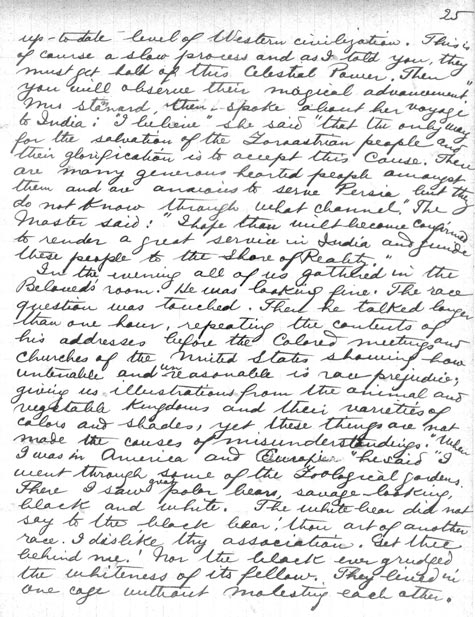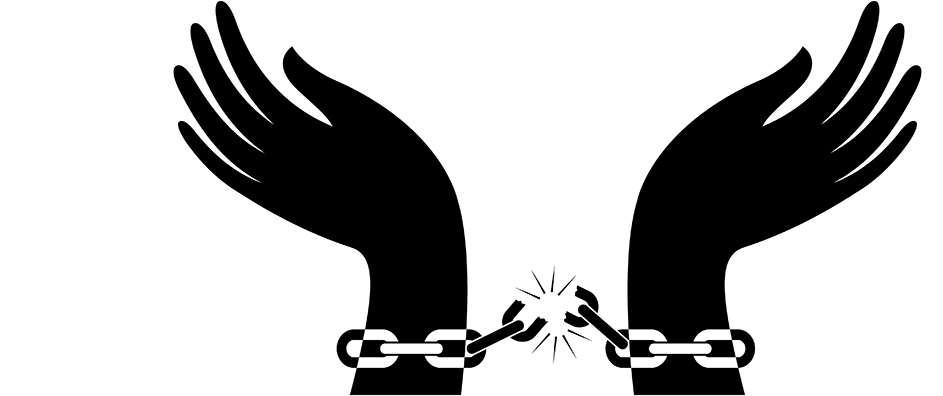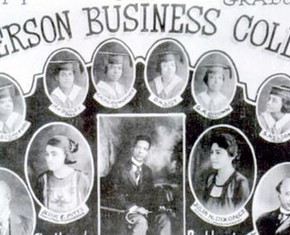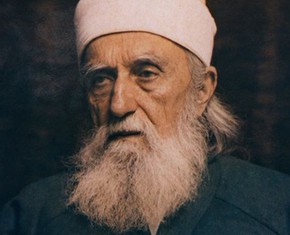The views expressed in our content reflect individual perspectives and do not represent the authoritative views of the Baha'i Faith.
Such was the sterling faithfulness of Isfandiyar that, whenever I think of him, my eyes grow dim with tears. He was a King among men, a glorious star in the heaven of humanity. Although his face was black, his heart was as white as the snow. He was peerless and had no equal. I cannot sufficiently praise him. I loved him. He was a glory and a jewel on the crown of the colored race. For his life was a noble record of proud achievements and the whole world will learn a lesson from him.
– Abdu’l-Baha, qtd. and provisionally translated (from the Persian original) in “Diary Notes of Ahmad Sohrab” (October 25, 1913, Ramleh, Egypt), Ahmad Sohrab Papers, Box 25, p. 29. Published by permission, courtesy of the National Baha’i Archives, United States.
These moving words are part of a long talk by Abdu’l-Baha (on October 25, 1913, in Ramleh, Egypt) about Isfandiyar, whom we first met in “The Races – Robed in Black or White.” Now, by permission of the U.S. National Baha’i Archives, the full narrative by Abdu’l-Baha is given in a provisional translation from the original Persian manuscript (kept in the International Baha’i Archives at the Baha’i World Centre) and published here for the first time. These are archival, historical documents, which are among the “primary sources” that historians draw upon when writing history.
These are documents 545–549 of the “Diary Notes of Ahmad Sohrab.” Sohrab was an able secretary of Abdu’l-Baha at that time. Later, Sohrab became jealous and wanted to share, or altogether assume, leadership of the American Baha’i community. But that’s a whole other story. Let’s return to Isfandiyar.
Earlier, we noted how Baha’u’llah liberated the slaves of his late, wealthy father, upon the latter’s death in 1839. Abdu’l-Baha’s account of this significant event is found on page 26 of the PDF that you can download at the end of this article.
Abdu’l-Baha relates:

The enemies of my Father, who [whose enemies] had poisoned the mind of the Shah —that he [Baha’u’llah] harbors secret plans against the throne — were convinced that Isfandiyar is the guardian of all the secret plans of Baha’u’llah. Therefore they imagined that once they lay their hands on Isfandiyar, they will force out of him everything and then be able to substantiate their vague accusations with these solid facts. Hence they commissioned 150 policeman to find him and bring him before them. …
One midnight, we arose out of our sleep by the loud knocking at the door. It was opened and, lo and behold, it was Isfandiyar. My mother told him with anxiety: “How is it that you are yet in the city? Do you not know that there are 150 policeman after you? Fly as quickly as you can. If they get hold of you, your life will be in danger.”
But he smiled and answered: “No. I will not leave Tehran, even if a thousand policemen are after me. I am not afraid. I have much debts in the bazaar. I owe money to many shopkeepers and, before I leave this city, I must pay off all the debts. I do not want the people to say afterward that the Negro-servant of Baha’u’llah escaped without paying his debts.”
Then he left us and, for one month and a half, he was walking in broad daylight in the streets and bazaars and finally succeeded to clear off all of his financial obligations.
All this time, the policemen were after him, but could not catch him. Then, one night, he appeared again and said: “I am now free! I have paid actually all my debts and will leave the city with a clear conscience.” He went to Mazandaran and the governor, who was not a Baha’i, engaged him in his service, made him the chief of his equerry and protected him from the pursuit of his enemies.
Years lapsed and the governor, being a religious man, desired to make a pilgrimage to the holy city of Karbala. Naturally, he took Isfandiyar with him, who had grown very much in his [the governor’s] favor and could not separate from him.
When they reached the city of Baghdad, Isfandiyar was overjoyed to stand again in the presence of Baha’u’llah, because he loved him most intensely. He requested Baha’u’llah to keep him with himself; that he [would] rather leave the governor and serve his old Master.
But Baha’u’llah told him: “You must act in this matter in accord with the wish of the governor. You owe him a debt of deep gratitude. Because, at a time that your life was in danger and no one would have received you, he gave you position and stopped the persecutions of your enemies. Now if he is is willing for you to remain with us, we will accept you. Otherwise, you must continue to serve him with the same zeal and sincerity that you have served us in the past.”
Isfandiyar went to the governor and explained his case. He [the governor] answered: “It is impossible. I cannot find in this wide world another man as honest and faithful as yourself. You must continue to stay with me. I have grown to love you and will do everything to add to your comfort and happiness.”
Of course, Isfandiyar was heartbroken over this decision. But he had to abide by the wish of Baha’u’llah. He, in turn, consoled him and showered upon him his blessings. Isfandiyar returned to Mazandaran with the governor and stayed with them till his last day.
Such was the sterling faithfulness of Isfandiyar that, whenever I think of him, my eyes grow dim with tears. He was a King among men, a glorious star in the heaven of humanity. Although his face was black, his heart was as white as the snow. He was peerless and had no equal. I cannot sufficiently praise him. I loved him. He was a glory and a jewel on the crown of the colored race. For his life was a noble record of proud achievements and the whole world will learn a lesson from him.
– Abdu’l-Baha, qtd. and provisionally translated (from the Persian original) in “Diary Notes of Ahmad Sohrab” (October 25, 1913, Ramleh, Egypt), Ahmad Sohrab Papers, Box 25, pp. 27–29. Published by permission, courtesy of the National Baha’i Archives, United States.
This historical passage was cited at length to bring to life Baha’u’llah’s role as a liberator, far in advance of his explicit, universal abolition of slavery in 1873 in the Most Holy Book. That singular act of universally abolishing slavery in 1873 — as a divine decree direct from God above — is unique in the annals of religious history.
In this series, we have referred to this signal event as the “Universal Emancipation Proclamation.” It is every bit as great as Abraham Lincoln’s Emancipation Proclamation, and probably greater, given its broader scope and universalism.
One aspect of Isfandiyar’s sterling character stands out: While Baha’u’llah freed Isfandiyar from slavery, Isfandiyar freed Baha’u’llah of his outstanding debts, as Abdu’l-Baha explains:
For one month Isfandiyar went about in the streets and bazaars. He had things to sell, and from his earnings he gradually paid his creditors. In fact, they were not his debts but the debts of the court, for all our properties had been confiscated. Everything we had was taken away from us. The only things that remained were our debts. Isfandiyar paid them in full; not a single penny remained unpaid. Then he came to us, said good-bye and went away. – Abdu’l-Baha, The Promulgation of Universal Peace, pp. 426–427.
Isfandiyar was not a Baha’i, for the simple reason that Baha’u’llah had not yet declared his mission. (That would come later, on April 22, 1863, although Baha’is commemorate this event a day earlier, for reasons that are beyond the scope of this article.) But Isfandiyar exemplified the nobility of character which the Baha’i Writings seek to inspire in you and I.
This wonderful, true story about Isfandiyar also illustrates the full humanity and soulfulness of this former slave, and emphasizes the love that Abdul-Baha had for him, who affectionately and respectfully said of Isfandiyar: “He was a King among men.”
Here is the archival translation of the Isfandiyar Sohrab Diary.
















Comments
Sign in or create an account
Continue with Googleor